In today’s digital era, safeguarding yourself, your computer, and your personal information online is increasingly crucial. Amidst the threats of hackers and stringent internet regulations, everyday internet users often find themselves caught in the middle.
To enhance internet security, one effective option is investing in a residential proxy service.
Residential proxies are often mentioned in the context of web scraping, but their use cases go far beyond that. For instance, streaming platforms, and even news sites often restrict content by geography. Residential proxies can simulate access from a different country to help you view local versions of websites or services.
Similarly, social platforms can sometimes flag multiple logins from the same IP as suspicious. Residential proxies can help you manage multiple accounts without triggering security checks.
But what sets residential proxies apart? Unlike general proxies that use IP addresses from ISPs unrelated to your home, residential proxies provide IP addresses from real consumer devices. This means when you use a residential proxy, your online activities are routed through residential IPs, concealing your original IP address and your true identity.
The market offers a variety of residential proxy providers, each with unique features like rotating residential proxies, which continually change the residential IPs, adding an extra layer of security and anonymity. It’s important to note that while using residential proxies is legal, it’s crucial to choose a proxy provider that adheres to legal and ethical standards. To help you navigate this landscape, we’ve compiled a list of some of the best residential proxy services available. Keep reading to discover which proxy server is the right fit for your needs.
We’ve also listed the best proxy for data centers.
Best Residential Proxy Service Providers of 2025 in full:
Why you can trust TechRadar
We spend hours testing every product or service we review, so you can be sure you’re buying the best. Find out more about how we test.
Best residential proxy overall
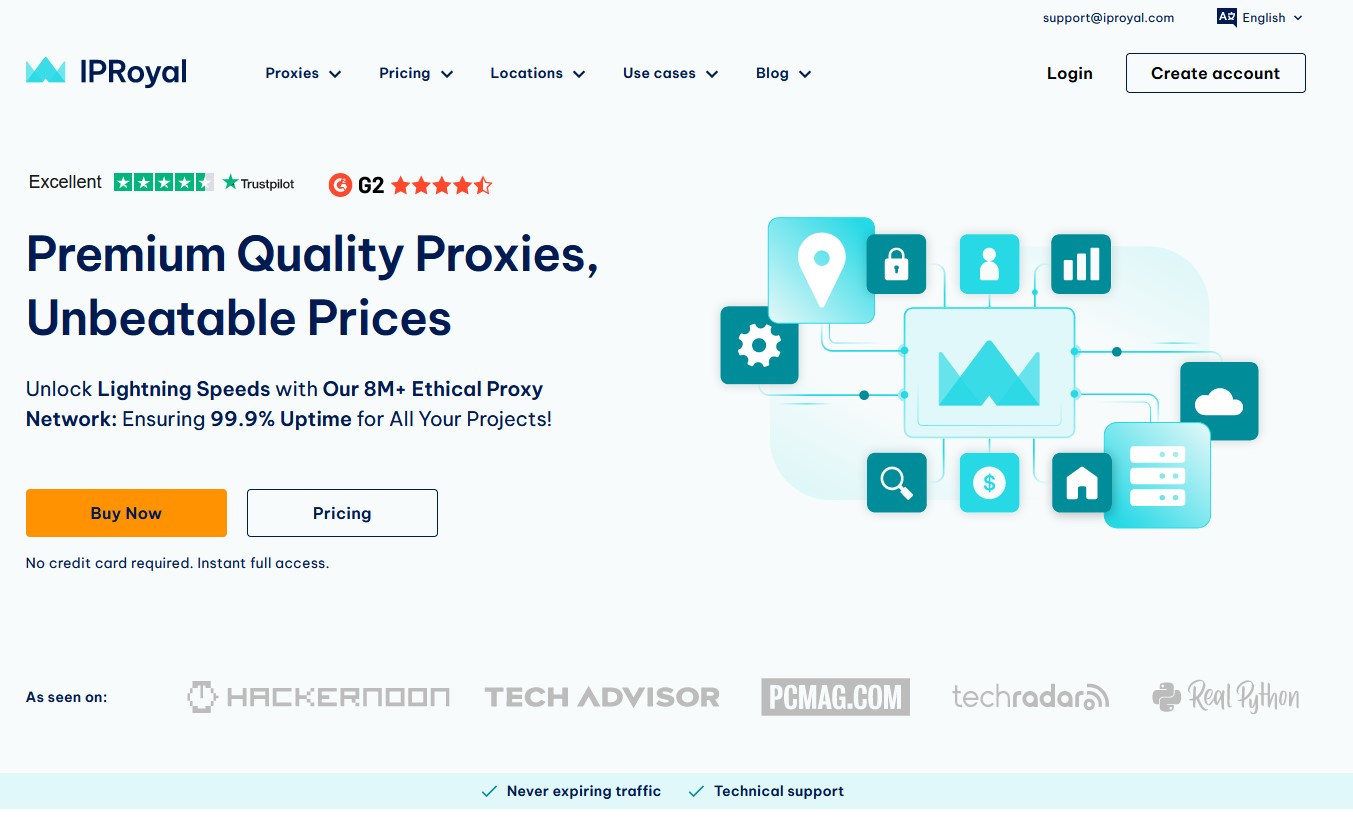
Based in the United Arab Emirates, IPRoyal offers several proxy solutions. These include datacenter, residential, and 3G/4G/5G mobile proxies among its over 34 million IPs from all over the world.
One of the first things to notice about IPRoyal is that it’s one of the most affordable services out there. For instance, the residential proxy pricing starts at $1.75/GB of bandwidth, and this gets IPs from all over the world with city/state targeting, both HTTP(S), and SOCKS5 support, and rotating IP addresses.
The service also has a pay as you go pricing plan that helps you avoid committing to a monthly contract, and pay only for the amount of bandwidth you need. Irrespective of how you pay for it, once you purchase residential proxy traffic, you can use it whenever you want as it never expires.
IPRoyal assigns dedicated residential IPs to each of its users, and supports both rotating and sticky sessions, with controls from per-request up to seven-day persistence. This dexterity makes it practical for both web scraping and for tasks that need a consistent IP identity, such as social media, and content streaming. It also doesn’t cap the number of concurrent sessions you can run, which makes it a good choice for certain use cases.
The service provides 24/7/365 live chat and email support, and their support agents are quite knowledgeable and quick to help. There’s no phone support, unfortunately.
All in all, IPRoyal is a great pick for your proxy needs, especially for individuals, and small teams, and for small-to-medium web automation projects. It might not have a very large proxy pool like some of its peers, but its cost-effective residential proxies, backed with a useful set of features make it a compelling option for virtually all kinds of use cases.
Read our full IPRoyal review.
Best residential proxy for feature variety
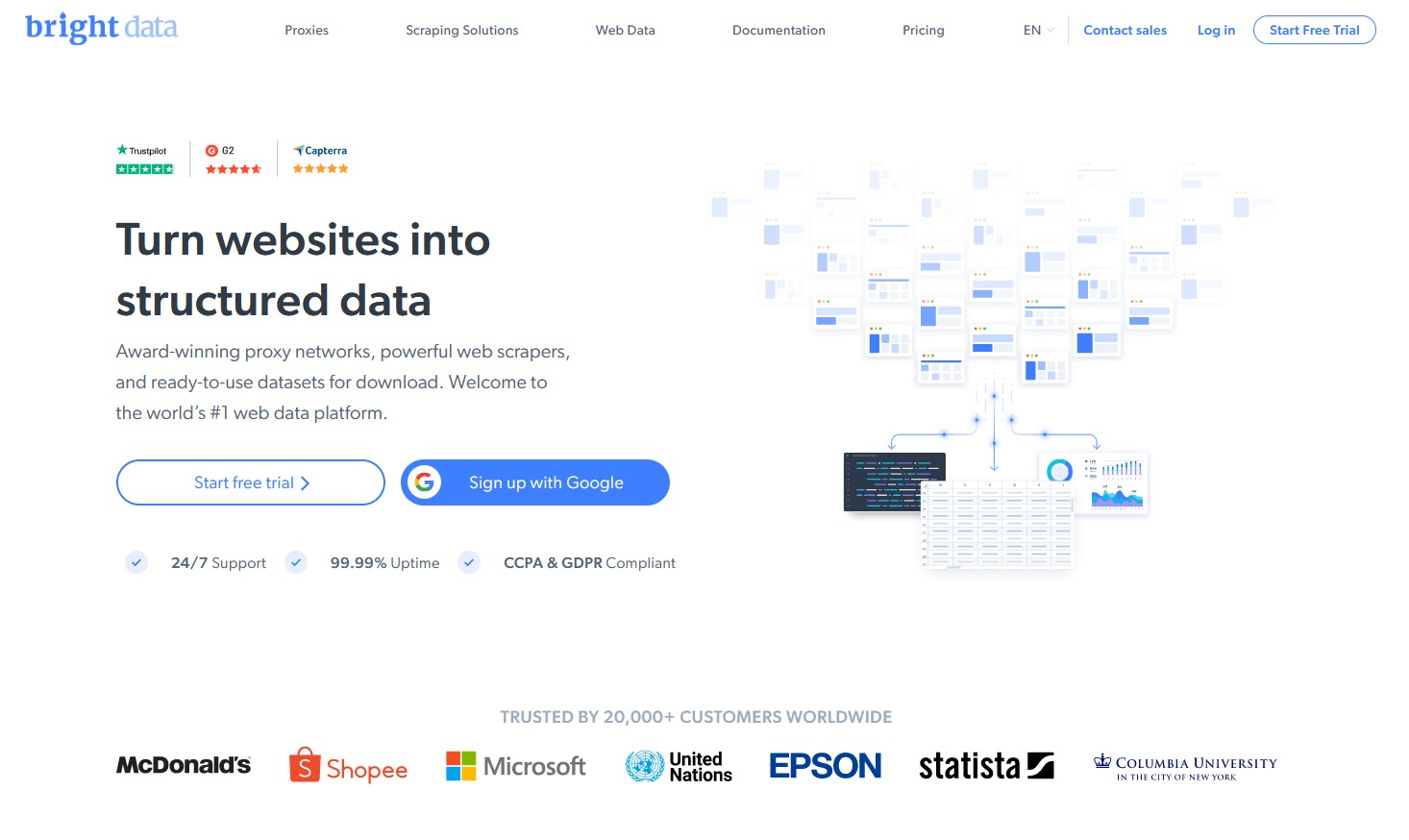
Bright Data (formerly known as Luminati) is one of the most prominent names in the proxy service space, particularly when it comes to residential proxies.
One of Bright Data’s core strengths lies in the sheer size and distribution of its proxy network. The service gives users access to over 150 million residential IP addresses globally. These are real IPs assigned to real devices, which helps you avoid CAPTCHAs, bans.
Residential proxies start at $5.04 per GB on the pay-as-you-go plan. For higher bandwidth needs, Bright Data offers monthly plans starting at $499 for 138GB, going all the way up to $1999 for 678GB. These subscription plans provide a lower effective cost per GB compared to the pay-as-you-go option, which makes them more cost-efficient for large scale tasks.
Bright Data’s residential proxies support the HTTP/S and SOCKS5 protocols. You can use them to create both rotating and sticky IPs, which makes them useful for all kinds of use cases. The proxies also support unlimited concurrent sessions, further enhancing their use especially for large scale tasks.
As a service provider, Bright Data says it helps businesses mitigate legal risks, by taking steps such as ensuring its proxies can’t be used to scrape PII.
Our tests showed that the performance is quite good and the Proxy Manager is easy to use with a user-friendly control panel. If you do come into any issues the company has 24/7 global support, ready to help. What’s more, there are plenty of video tutorials and webinars on the website to get you started or help you with any problems you might have.
Read our full Bright Data review.
Best residential proxy for anonymity
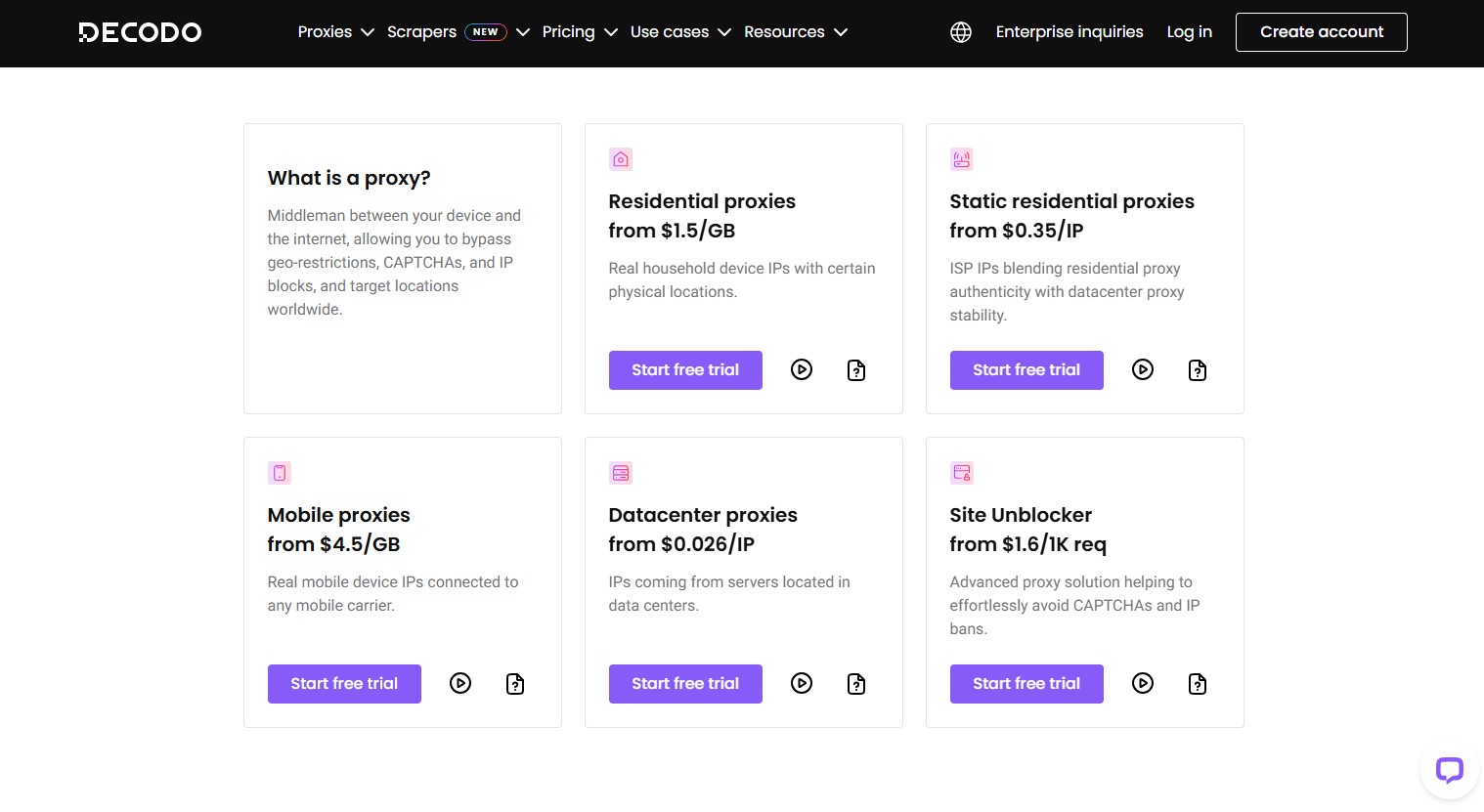
Decodo (formerly Smartproxy) operates with over 125 million global IP addresses on a global scale across residential, mobile, and datacenter solutions. Its residential proxy network has over 115 million ethically sourced residential proxies from across the globe.
This vast array of IPs offers users a high degree of flexibility, as you can create both rotating and sticky sessions. The proxies support both HTTP(S) and SOCKS5 protocols, and allow you to run any number of concurrent sessions. This feature comes in handy for businesses looking to conduct significant traffic throughout or engage in activities like SEO auditing.
Decodo offers pricing plans for both regular users that need up to 100GB of traffic every month, and for larger enterprise users that need at least 250GB of data every month. The plans range from $6/month for the 2GB plan, to $1500/month for the 1TB plan.
While its regular residential proxies come from a rotating pool of IP addresses, Decodo also offers static residential proxies. These range from $6.5/month for 1GB to $2750/month for 1TB of bandwidth. You can also pay for them per IP, with prices ranging from $4.7/month for 10 IPs to $2160/month for 8000 IPs. While these static residential proxies come from a shared pool, you can also pay for dedicated ones. These start from $9.99/month for 3 IPs, and go all the way to $4000/month for 2000 IPs.
Decodo has add-ons for all the best web browsers, as well as a handful of useful tools like the proxy checker to check your IPs, and the X Browser to enhance anonymity, and bypass geo-restrictions. It also offers ample documentation to help you integrate its proxies with popular web scraper and data collection tools.
Read our full Decodo review.
Best residential proxy for web scraping
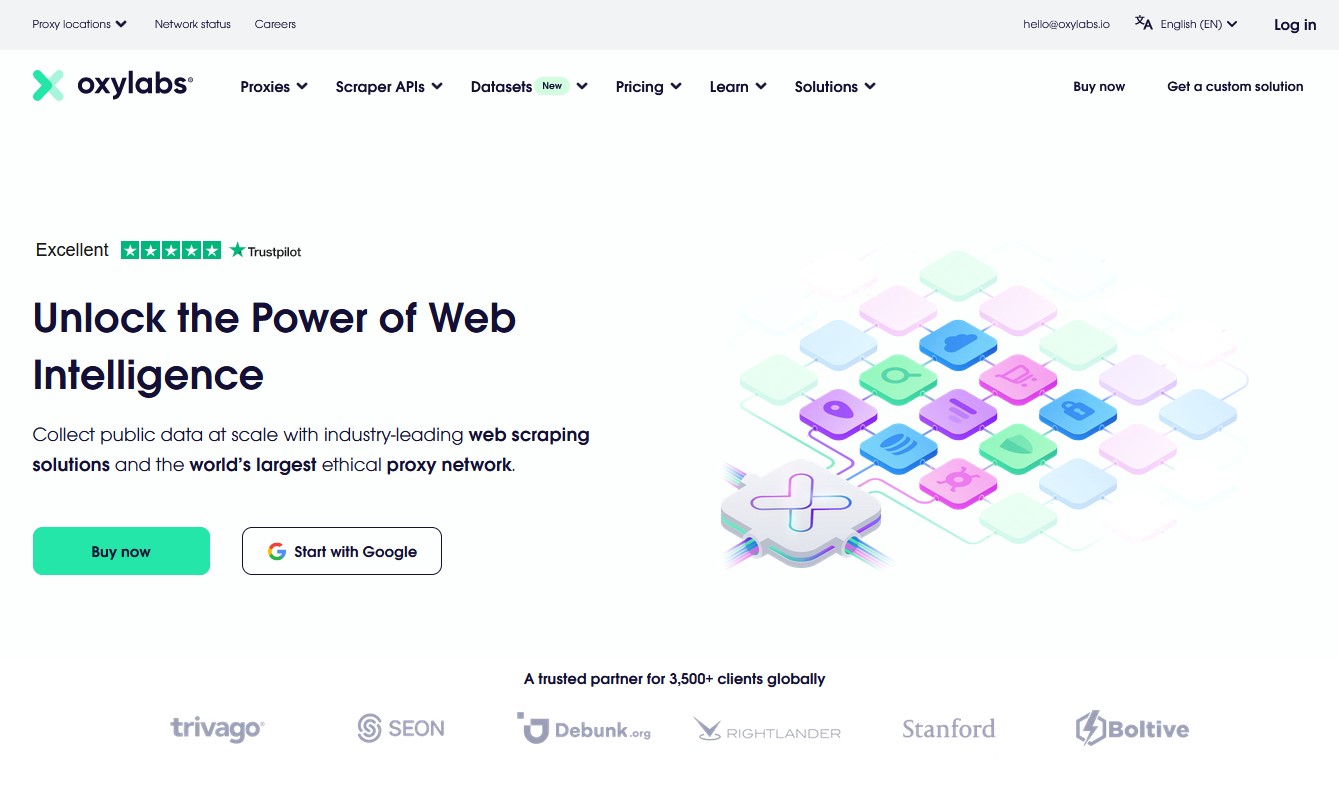
Our next pick is Oxylabs, which is one of the toughest competitors of Decodo. Based in Lithuania, it boasts a relatively large portfolio compared to its peers. We admire it for its technologically advanced solution and massive IP pool. In fact, it has over 175 million residential IPs from across 195 countries.
Oxylabs claims all of its residential IPs are obtained ethically through voluntary opt-in mechanisms, and the company complies with major data protection regulations.
Like all top residential proxy providers, Oxylabs too supports both rotating and sticky sessions, which provides enough flexibility for all kinds of use cases, from simple anonymous browsing to managing tasks that require session persistence.
The provider offers a pay-as-you-go plan for residential proxies at $4 per GB, but also has set plans, ranging from the $45.5/month for 13GB all the way up to the $2000/month for 1TB of traffic. All of its plans allow you to run an unlimited number of concurrent sessions.
One of the major advantages of using Oxylabs’ residential proxies is the precision targeting.
The platform supports geographic filtering at the continent, country, city, state-level, and ZIP code level.
The platform also offers a relatively straightforward integration experience with its proxies being compatible with popular scraping and data collection tools. Its dashboard provides a clean interface for managing proxies and monitoring usage.
You also get ample documentation, and there’s around-the-clock technical support via chat and email. If you subscribe to one of its enterprise packages you also get a dedicated account manager to help you with onboarding and troubleshooting.
Read our full Oxylabs review.
Best residential proxy for mobile
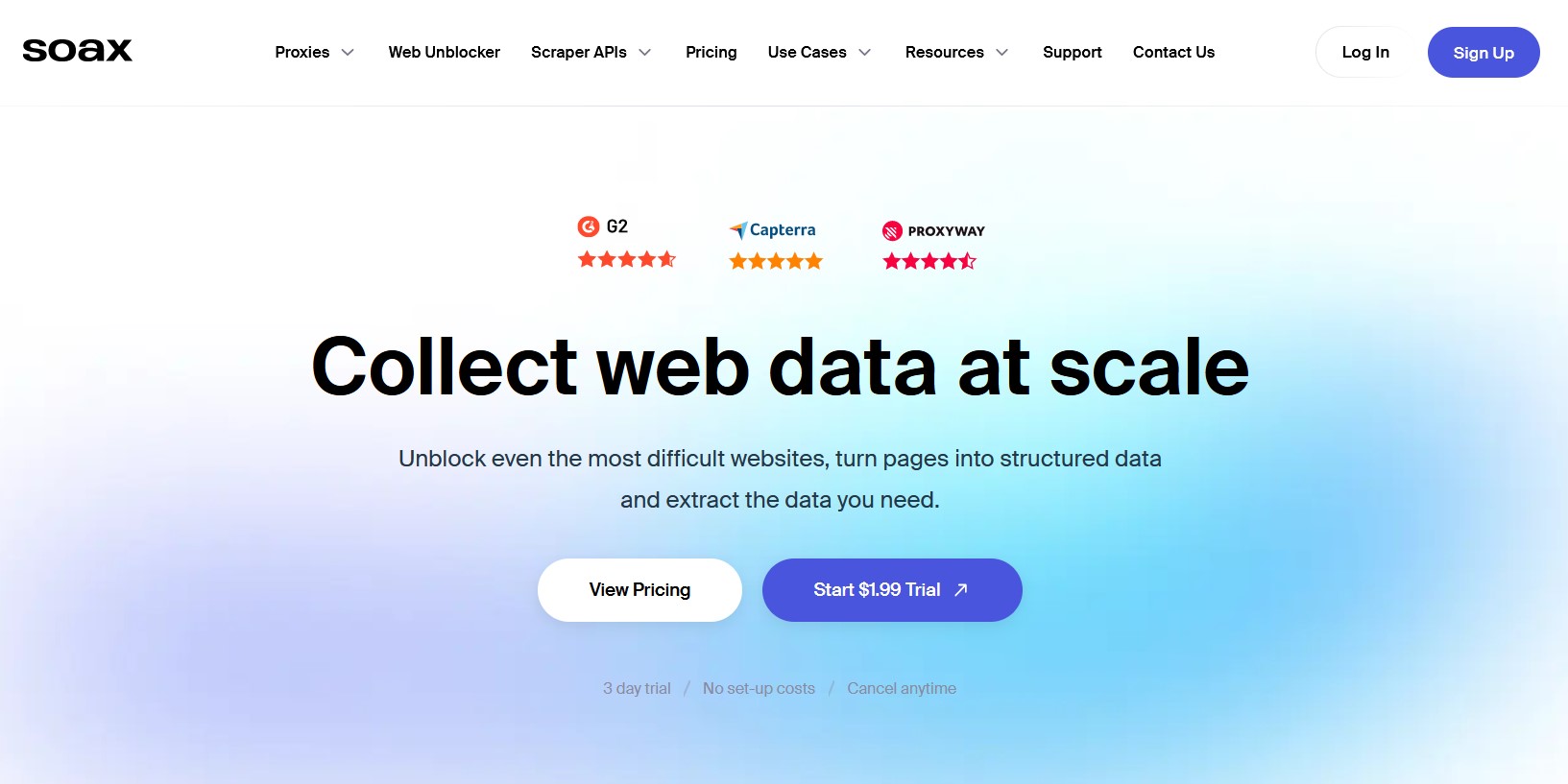
While it may be one of the newest names in the space, SOAX offers a compelling mix of flexibility, precision, and performance that we think will appeal to both individual users and enterprise users.
SOAX is based in the UK, and claims its residential IP pool is made up of over 155+ million IPs from over 195 locations all over the world.
The service says its residential IPs are ethically sourced from real user devices, which makes them particularly effective for navigating websites with anti-bot measures, and enables you to run your data collections tasks without any interruptions. Besides these it also offers a worldwide pool of over 33 million 5G, 4G, 3G, and LTE mobile proxies.
SOAX’s residential proxies support both HTTP(S) and SOCKS5 protocols, along with the UDP, and QUIC protocols. You can create both sticky and rotating sessions, and customize the IP refresh rates as per your needs. The service also enables you to run any number of concurrent connections.
What really sets SOAX apart is its advanced geo-targeting capabilities. Users can filter proxies not just by country, but by region, city, and even the internet service provider. The ability to pinpoint proxy locations with such precision gives you far more control over your data collection and verification tasks.
SOAX primarily offers subscription-based plans. The pricing for its residential and mobile proxies starts with the $90/month Starter plan that includes 25GB of traffic, and goes all the way up to the $1600/month Business plan that includes 800GB of traffic. If you have intermittent data requirements you can start with their pay-as-you-go payment plan that begins at $4/GB. The service doesn’t have a free trial, but you can test the service by paying $1.99, which gets you 400MB of traffic for three days.
Read our full SOAX review.
Best residential proxy for beginners
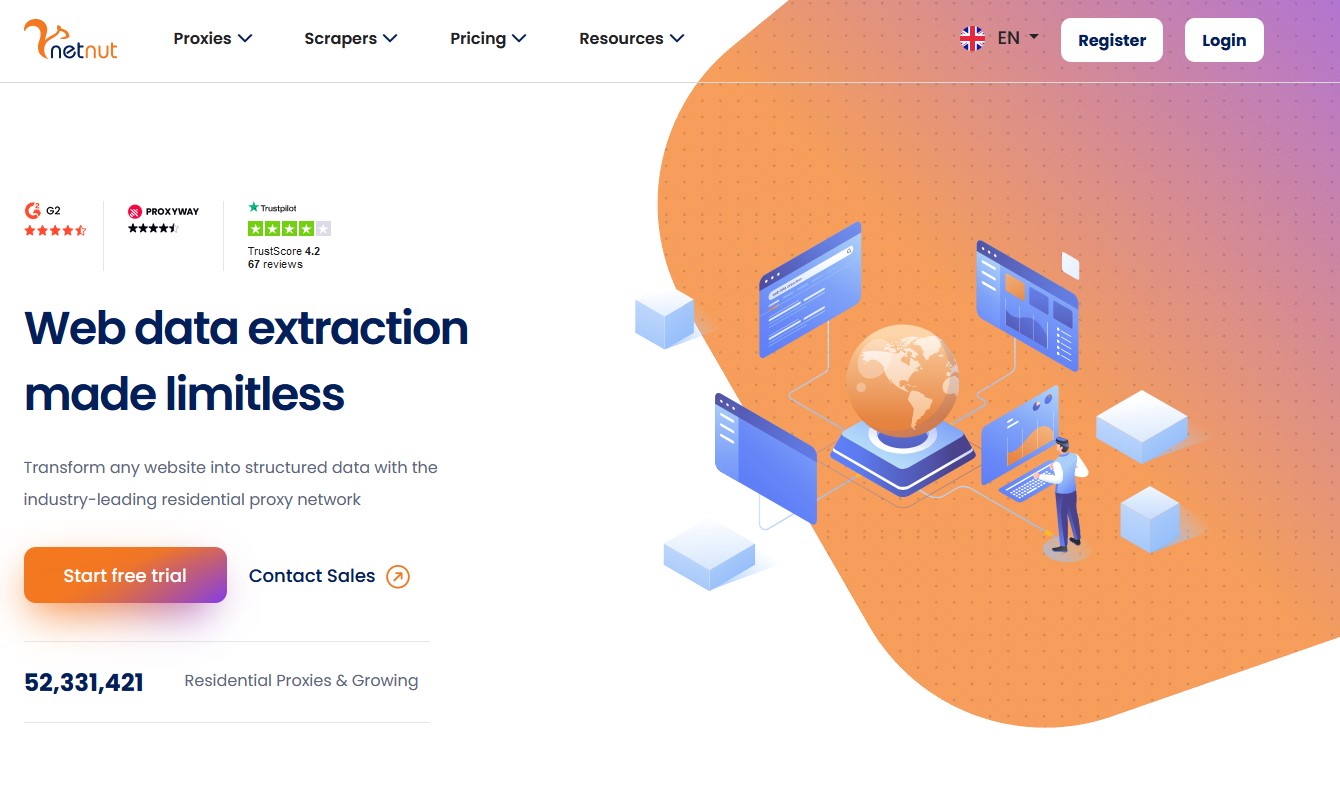
Despite being a less popular alternative than SOAX, Oxylabs, or Decodo, NetNut is a familiar name in the business world. This Israeli proxy provider opened its doors in 2017, and was acquired by the Safe-T Group in 2019.
With a proxy pool of over 85 million residential IPs from 195 countries, the service offers adequate global reach and scalability.
Its rotating residential proxies support HTTP(S), and SOCKS5 protocols, and will let you run as many concurrent sessions as your workload demands. NetNut rotates IPs every session by default, but also enables you to create sticky sessions.
One of NetNut’s standout features is its use of ISP-sourced static residential IPs, which are usually considered more stable than the traditional residential proxies. This can be especially advantageous for tasks that require persistent sessions, such as e-commerce monitoring, and SEO tracking.
The platform also offers an intuitive analytics dashboard that helps you monitor performance metrics, usage patterns, and success rates. Customer support is another area where NetNut performs well. A seven-day trial is available upon request, and once onboard, you’ll get a dedicated account manager, and support via email and live chat.
That said, the service has some downsides as well. For starters, it isn’t really cheap, especially if you are a low-volume user. The pricing for its residential proxies start with the $99/month Starter plan that includes 28GB of traffic, and goes all the way up to the $3750/month Master plan that includes 2TB of data.
As is the norm across the proxy provider space, the pricing per GB falls as you move up the pricing tiers. Despite this, NetNut has one of the highest per GB cost, which makes it especially less suitable for budget-conscious users. The lack of a pay-as-you-go payment plan also makes the service unattractive to users with intermittent data requirements.
Read our full NetNut review.
Best residential proxy for scaling
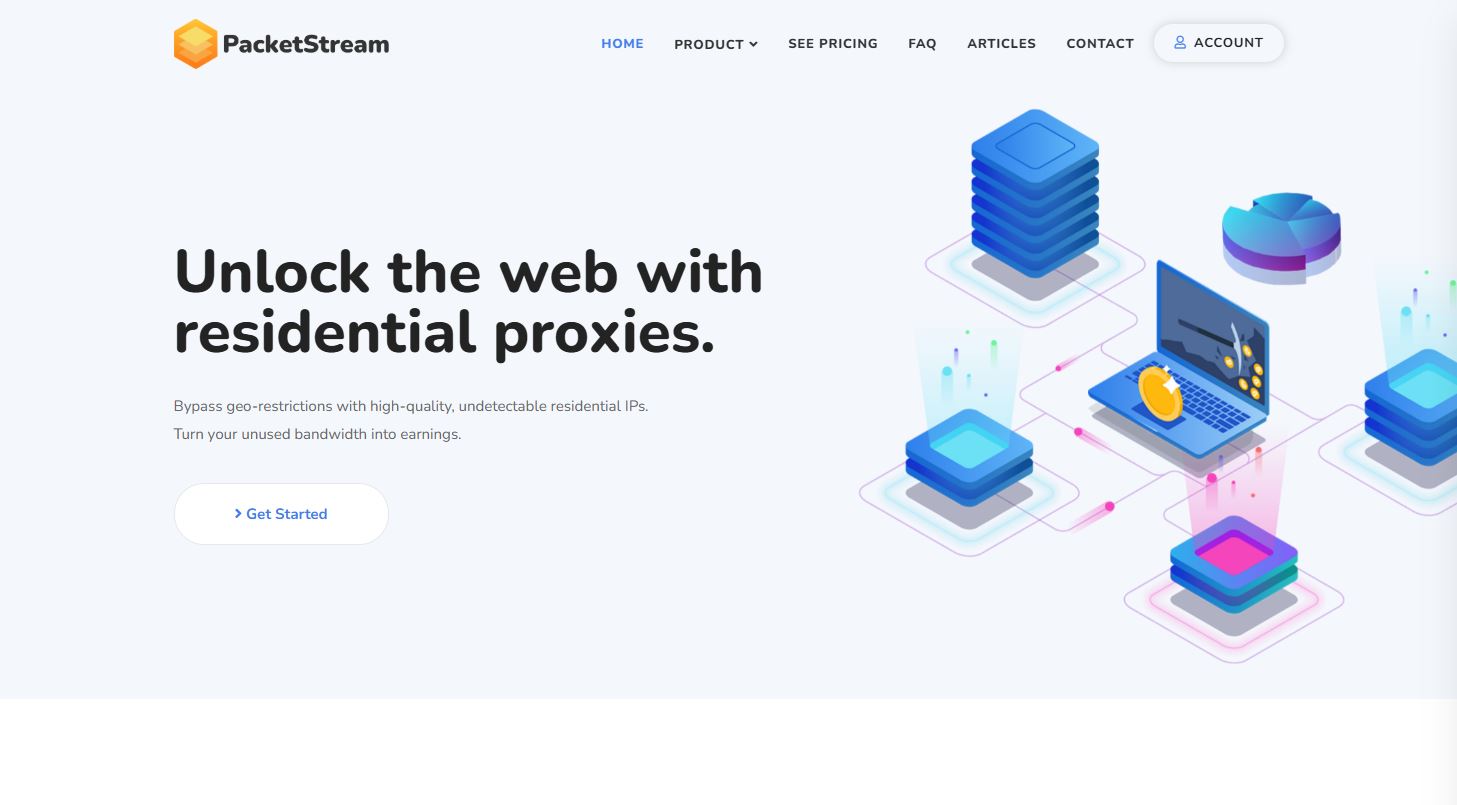
PacketStream takes a focused approach to proxy services as it only offers residential proxies, which sets it apart from many competitors that bundle multiple proxy types. One of the most attractive aspects of the platform is its simple pricing structure, a flat rate of $1 per GB. This grants you full access to its residential proxy pool, and supports both HTTP and SOCKS protocols, making it a flexible option for a variety of data collection applications.
You also get the option to choose between rotating IPs that change with every request, or sticky sessions that maintain the same IP for a longer duration. Thanks to this flexibility you can use PacketStream’s residential proxies for everything from basic scraping tasks to operations such as account creation, where consistent sessions are important.
To get started, however, there’s a minimum purchase requirement of 50GB or $50. While this might be a deterrent for casual users or those looking to run small-scale tests, the $1 per GB rate is still among the most competitive in the residential proxy market.
Another notable feature of PacketStream is its bandwidth-sharing model. You can opt to sell your unused internet bandwidth back to the network at a rate of $0.10 per GB. With a minimum payout threshold of $5, this setup introduces a passive earning opportunity for you, while it helps the service provider build their infrastructure.
Despite its strengths, there are a few limitations you must keep in mind. Our biggest gripe is that PacketStream does not publish information about the size of its IP pool or provide a detailed list of countries it covers. While the platform does offer location targeting, the lack of upfront transparency about its network doesn’t sit well.
Also, while a free trial is available, access to it isn’t immediate. You’ll need to reach out to the sales team to get your trial approved. Customer support is also limited to email, which could be inconvenient for users who need faster assistance.
Read our full PacketStream review.
Best residential proxy for ease of use
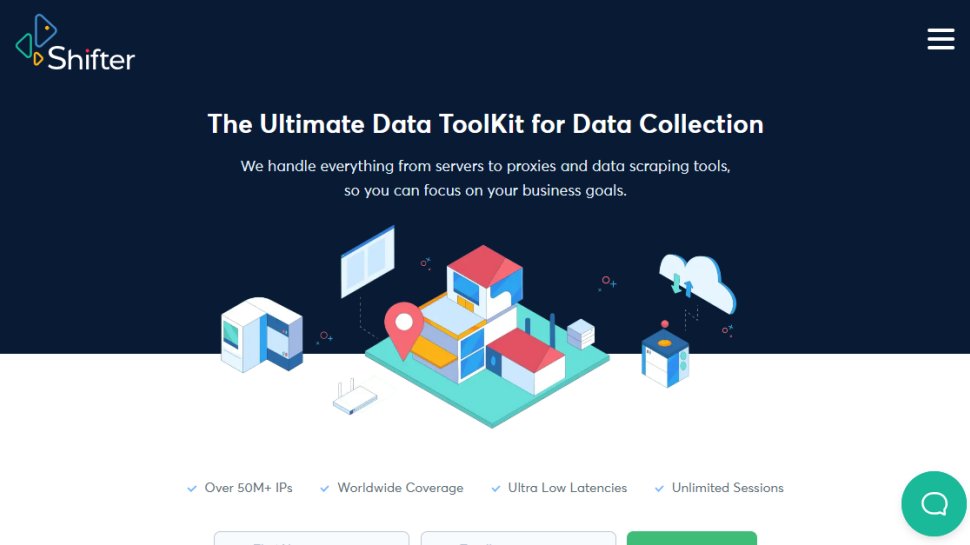
Shifter, previously known as Microleaves, is a long-standing player in the residential proxy space. In terms of size, the platform boasts of a network of 50 million IPs from all over the world.
It offers both rotating and static residential proxies, with two distinct rotating residential proxy products, namely basic and special. Rotating residential proxies are randomly assigned a residential IP address from the pool. They’ll get you a unique IP address every rotation, which can range from five minutes to 60 minutes.
Importantly though, the basic rotating proxies don’t allow geotargeting and are assigned only random IPs from Tier 2 and Tier 3 countries. They also only support the HTTP/HTTPS protocols, and don’t work on what Shifter calls “high usage” websites such as Amazon, Google, Facebook, and such.
Meanwhile, special rotating residential proxies support geotargeting. These plans get IPs from Tier 1 countries as well, are compatible with Socks 4 and 5 protocols, and can access the “high usage” websites.
Both the rotating proxy plans are charged per proxy port, and come with a predefined traffic limit. Also, you can run a maximum of 50 concurrent sessions on each port.
The cheapest basic rotating proxy plan costs $99.98/month and includes five ports, and 200 GB of traffic. On the other end of the spectrum, you have the $599.99/month plan that includes 50 ports and 2TB of traffic.
Special rotating proxies are a lot more expensive. For instance, the starter five port/200GB special rotating proxy plan costs $199.99/month, while the top end 50 port/2TB special rotating proxy plan costs $1199.99/month.
On the other hand, the static residential proxies include unlimited bandwidth, and are charged per IP. According to Shifter, these proxies originate from datacenter proxies, but are assigned to a residential ISP.
These are the cheapest, with a pack of 25 static IPs costing $74.99/month, while a pack of 100 static IPs costs $299.99/month. However, these static residential proxies only get US IPs.
Unlike many of its peers, Shifter doesn’t have pay-as-you-go pricing plans, which makes them more expensive for people with intermittent requirements. Business users can ask the company for a free trial, but individual users don’t even get that luxury. Another downer is that Shifter only provides support via a chatbox on its website.
Best residential proxy FAQs
1. What is a residential proxy?
A residential proxy is an intermediary that uses an IP address provided by an Internet Service Provider (ISP), not a data center. This IP is attached to a physical location, and the proxy acts as a middleman between the user and the web, masking the user’s real IP address.
2. Why should I use a residential proxy?
Residential proxies provide anonymity when browsing the internet. They’re excellent for data scraping, managing social media accounts, overcoming geo-restrictions, and conducting market research.
3. Which residential proxy is the fastest?
The speed of a residential proxy depends on various factors, including the provider’s infrastructure and the proxy’s location. Oxylabs and Decodo are known for their high-speed connections.
4. Is using a residential proxy legal?
Yes, using a residential proxy is completely legal. However, what you do with the proxy can be subject to legal and ethical considerations.
5. How to choose the right residential proxy provider?
The choice depends on your specific needs. Consider factors such as network size and diversity, speed and performance, security and anonymity, customer support, and pricing.
6. Are residential proxies undetectable?
Residential proxies are generally harder to identify than data center proxies, owing to their association with genuine residential IP addresses. Nonetheless, certain sophisticated detection techniques are capable of recognizing residential proxies.
7. What’s the difference between mobile proxies and residential proxies?
In the context of automated tasks, mobile proxies hold certain advantages over residential proxies. They are particularly effective for tasks that require access to mobile-oriented content or applications. This capability allows businesses to simulate mobile user behavior accurately, accessing mobile-specific features and data.
Additionally, mobile proxies offer a higher degree of anonymity, making it more challenging for websites and services to detect and block their use. While residential proxies are beneficial for general web scraping tasks, they may not match the precision and authenticity mobile proxies provide for mobile-specific content. Thus, for enterprises involved in web scraping, mobile proxies present a more complete and efficient solution.
8. Should I use VPN or a residential proxy?
For individual users, a VPN often proves to be the better choice. It is specific to the device in use and is particularly favored for accessing streaming services from different countries. A VPN enables users to bypass geographical restrictions on websites effectively.
Comparatively, residential proxies, unlike datacenter proxies, come from real devices, which makes them appear less suspicious to websites. This feature is especially beneficial for web scraping and research, as residential proxies are less likely to be banned by websites, offering a more reliable option for such tasks.
Conclusion
The market is filled with various residential proxy providers, each offering a unique set of features and benefits. While some may align perfectly with your needs, others might not be as suitable. Ultimately, selecting the right residential proxy service boils down to your available time and budget. Generally, these services tend to be priced higher compared to other alternatives. However, they support a wide range of applications, providing extensive utility. This means that depending on your budgetary constraints, you might find more value in exploring alternatives that still meet your requirements effectively.
We’ve listed the best free proxies.
How to pick the best residential proxy
When choosing the right residential proxy, you should consider the following factors without exception:
Network Size and Diversity
The size and diversity of the provider’s network are vital considerations when selecting the best residential proxy. A larger network implies a higher number of IP addresses. This variety allows for better anonymity as there are more addresses that your internet requests can route through. This, consequently, reduces the likelihood of being blocked or flagged.
Moreover, a diverse network ensures extensive geo-coverage. It provides you with a broad range of IP addresses from different countries or regions. This is particularly advantageous for tasks that require bypassing geo-restrictions or performing market research in different geographical areas.
Speed and Performance
The proxy speed can drastically impact your experience, especially if you’re involved in activities requiring fast response times. They may include web scraping, ad verification, and market monitoring.
High-speed proxies ensure minimal delays and efficient operations. This eventually enables you to extract data swiftly.
Besides, the proxy’s performance is crucial. A stable connection reduces the risk of interruptions during your online activities. Always look for providers known for their speed and top-of-the-line performance.
Security and Anonymity
As you navigate the online world, maintaining security and anonymity is paramount. The best residential proxy providers deploy advanced security measures to protect your data from potential threats. This can include data encryption and the use of secure protocols like HTTPS.
Anonymity, on the other hand, is the key value proposition of any proxy service. A provider offering high-level anonymity ensures your real IP address is hidden. This is particularly important if you’re involved in sensitive tasks that require a high degree of privacy.
Customer Support
Reliable customer support can significantly enhance your experience with a residential proxy provider. Proxy networks can be complex, and you may encounter issues or have queries during regular use.
In such cases, you may need the help of a responsive and knowledgeable customer support team. Ideally, you need to look for providers that offer 24/7 support either via a live chat box or email and have a reputation for quick and effective problem resolution.
It’s not only about responsiveness; the quality of assistance also matters. The support team should be capable of addressing a wide range of technical issues.
Pricing
While you may be tempted to go for the cheapest option available, it’s essential to consider the value you’re getting for your money.
The best residential proxy providers offer a balance between cost and quality. They provide high-performing, secure, and reliable proxies at reasonable prices.
Besides the structure, you should pay attention to the flexibility of pricing. Providers that offer various plans or pay-as-you-go options can accommodate a wider range of budgets and usage patterns.
However, remember that a higher price often translates to more advanced features, better performance, and superior customer support. Therefore, consider your specific needs and the value you’re getting before making a decision based solely on price.
link
